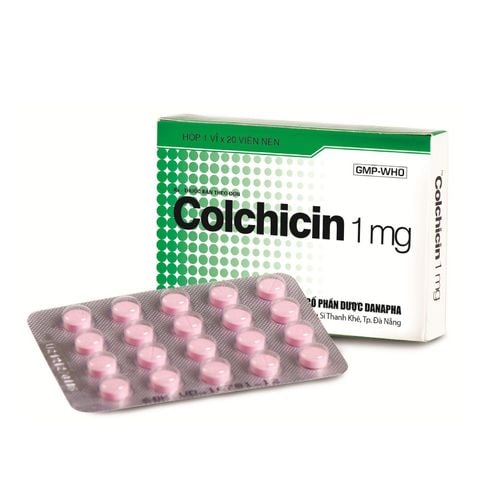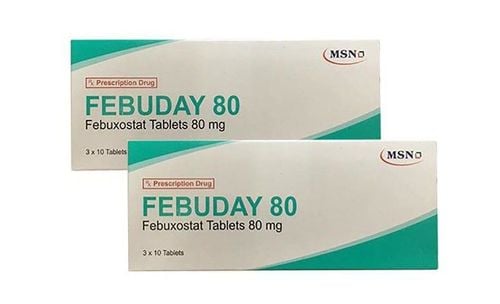This is an automatically translated article.
Febuxotid is a drug indicated for the treatment of chronic hyperuricemia in adults in patients with gout. To ensure effective use and avoid unwanted side effects, patients need to strictly follow the instructions of the doctor or pharmacist.
1. What is Febuxotid?
Febuxotid 40 mg is manufactured by An Thien Pharmaceutical Joint Stock Company. This is a medicine to treat chronic hyperuricemia in adults.
2. Ingredients of Febuxotid
Main active ingredient: Febuxostat 40mg Febuxotid 40 mg comes in the form of oval-shaped tablets, yellow film-coated, one side has graduated lines, one side has the letter AT, the side and the healthy member.
3. Uses of Febuxotid
Febuxotid is used to treat chronic hyperuricemia in gout patients. This drug is also indicated for patients with urate deposition (including history or current history of urate stones and/or arthritis in gout). Febuxotid is not recommended for the treatment of asymptomatic hyperuricemia.
Febuxotid acts rapidly, allowing the serum uric acid concentration to be rechecked after only 2 weeks. The goal of drug therapy is to reduce and maintain serum uric acid levels below 6 mg/dL (357 pmol/L). Helps prevent gout flare-ups for at least 6 months.
4. What is the dose of Febuxotid?
How to take Febuxotid : Take orally
Dosage for adults (>18 years old)
The recommended starting dose of Febuxotid is 40 mg/time/day. For patients who do not achieve serum uric acid levels below 6 mg/dL after 2-4 weeks, a dose of 120 mg once daily may be considered. Pediatric Dosage
Safety and efficacy of Febuxotid in children under 18 years of age have not been established at this time. Dosage for some other subjects
For the elderly: no need to adjust the dose. For patients with severe renal impairment: Efficacy and safety have not been fully evaluated (creatinine clearance < 30 ml/min). In patients with mild or moderate renal impairment, no dose adjustment is required. For patients with severe hepatic impairment (Child Pugh grade C): The efficacy and safety of Febuxotid have not been studied. The recommended dose in patients with mild hepatic impairment is 80 mg. Study data are limited in patients with moderate hepatic impairment.
5. Side effects when using Febuxotid
Some possible side effects during the use of Febuxotid:
Anaphylaxis, hypersensitivity to the drug Skin rash can be life-threatening by forming blisters, peeling skin and other symptoms. internal surfaces of body cavities such as: mouth and genitals, painful ulcers in the mouth and/or genital area, accompanied by fever, sore throat and fatigue. (Stevens-Johnson syndrome/Toxic Necrolysis) or enlarged lymph nodes, liver enlargement, hepatitis (up to liver failure), increased white blood cell count in the blood (drug reaction to eosinophils) and systemic symptoms-DRESS) Contraindications: All those who are sensitive to the components of the drug. Febuxotid is a drug indicated for the treatment of chronic hyperuricemia in adults in patients with gout. To ensure effective use and avoid unwanted side effects, patients need to strictly follow the instructions of the doctor or pharmacist.
Follow Vinmec International General Hospital website to get more health, nutrition and beauty information to protect the health of yourself and your loved ones in your family.
Please dial HOTLINE for more information or register for an appointment HERE. Download MyVinmec app to make appointments faster and to manage your bookings easily.













